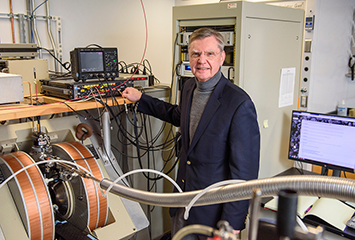Unlocking the Mysteries of Chirality-Induced Spin Selectivity (CISS) in Isolated Molecules
New observation of the CISS effect has implications for quantum information, energy, and biology

Northwestern University is among twenty-nine groups backed by European Research Council (ERC) Synergy Grants to tackle complex research questions. Recipients were announced Tuesday, October 25, 2022.
A six-year grant for nine-million euro was awarded to a team of four Principal Investigators including Michael R. Wasielewski; Clare Hamilton Hall Professor of Chemistry; Executive Director, Institute for Sustainability and Energy at Northwestern (ISEN); and Director, Center for Molecular Quantum Transduction (CMQT) – a US-DOE Energy Frontier Research Center. Their funded proposal is “Chirality and spin selectivity in electron transfer processes: from quantum detection to quantum enabled technologies,” with an acronym of CASTLE. Additional PIs represent the University of Florence, Free University of Berlin, and University of Parma.
“Chirality (or handedness) is everywhere in nature. Understanding how to use chirality to control electron spins is an important new direction in quantum information science. We are delighted that the European Research Council has given our team the opportunity to develop this understanding. Harnessing the expertise needed to solve such complex problems benefits greatly from international collaboration,” said Wasielewski, who leads the Wasielewski Research Group at Northwestern. In addition, he is a member of the Executive Committee of the Initiative at Northwestern for Quantum Information Research and Engineering (INQUIRE).
Wasielewski’s prior research has resulted in over 760 publications and focuses on light-driven processes in molecules and materials, artificial photosynthesis, molecular electronics, quantum information science, ultrafast optical spectroscopy, and time-resolved electron paramagnetic resonance spectroscopy. His honors and awards include election to the National Academy of Sciences and the American Academy of Arts and Sciences.
The new funding allows Northwestern to continue to provide cutting edge research in quantum science on a global scale. Northwestern is also active with quantum research networks as a member of the Chicago Quantum Exchange (CQE).
According to the ERC, almost 360 proposals were submitted in this first ERC Synergy Grant call under the EU’s Horizon Europe program. The funding, worth in total 295 million euro, will help groups of two to four outstanding researchers bring together complementary skills, knowledge and resources in one ambitious project. The 29 winning projects involve 105 principal investigators who will carry out their research at universities and research centers in 19 countries across Europe and beyond.
Synergy Grants support small groups of two to four Principal Investigators to jointly address ambitious research problems that could not be addressed by the individual principal investigators and their teams working alone. The projects should enable substantial advances at the frontiers of knowledge, including unconventional approaches and investigations at the interface between established disciplines. The transformative research funded by Synergy Grants should have the potential of becoming a benchmark on a global scale. More about Synergy Grants.